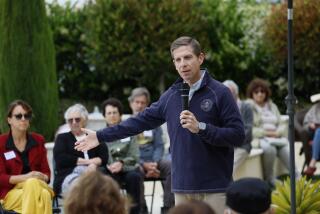Brown’s Departure Seen as Big Boost for McCarthy : Politics: Backers of Reps. Boxer and Levine think the move also benefits their candidates. But the GOP had considered the ex-governor an inviting target.
Given the twist-of-Zen politics Jerry Brown practices, maybe it made sense that he dropped out of the running for the U. S. Senate before he ever formally entered the race. But as California’s ranking political dervish set off for the presidency without comment Tuesday, it was left to others to ponder the impact.
Brown’s departure, announced in a letter to his supporters, drew groans from state Republicans who had counted on him as the next best thing to the return of Michael S. Dukakis in a tank.
And it left three Democratic survivors carefully calibrating what Brown’s departure would mean for their bid for the seat now held by retiring Sen. Alan Cranston.
Some suggested that Brown’s departure opened the door for lesser-known U. S. Rep. Mel Levine of Santa Monica to use his hefty campaign war chest to his benefit. And U. S. Rep. Barbara Boxer of Greenbrae, some argued, could find her campaign aided by liberals abandoned by Brown.
But most early assessments proclaimed an immediate boost for Lt. Gov. Leo McCarthy, the best-known of the three likely combatants and the only one with statewide electoral experience.
“I would think there’s joy in McCarthyville right now,” said Republican strategist Ken Khachigian, the campaign manager for commentator Bruce Herschensohn, who is seeking the GOP nomination for the seat.
There was. McCarthy’s campaign immediately hinted that the three-term lieutenant governor would seek to isolate Boxer and Levine as insiders responsible for the ills of Congress.
“It leaves Leo as the only candidate in the race who can appeal to voters who are dissatisfied with Congress,” said McCarthy’s campaign manager, Roy Behr. “A race between a proven vote-getter and two unknowns who have to defend Congress--that’s good for us.”
Although Boxer has formally announced she will run for Senate, Levine has not--but he indicated Tuesday that an announcement will come in about two months. Levine said he still is leaning toward running for the Cranston seat, one of two Senate seats up for election in California next year. Former gubernatorial nominee Dianne Feinstein is the only Democrat officially running for the second seat now held by Republican appointee John Seymour, although State Controller Gray Davis is actively considering the race.
Levine said Tuesday that Brown’s departure--and the earlier exit of U. S. Rep. Robert T. Matsui--will boost his campaign, which has thus far generated tremendous sums of money but made few impressions on the public mind.
“It’s going to make it easier for me to get my message to voters,” Levine said.
Boxer was seen as less likely to pick up steam as the race thins, because she enjoys neither McCarthy’s relatively high visibility nor Levine’s $3-million campaign fund. But some cautioned that she would be the likely recipient of support from those Brown supporters who are strong party liberals.
“Barbara can appeal to a lot of his supporters because she has a strong record of activism in Congress,” said Boxer’s campaign manager, Rose Kapolczynski . “I don’t think anyone’s supporters are monolithic; they are going to look carefully at the other candidates.”
Brown’s withdrawal from the Senate race denied state Republicans the pleasure of aiming harsh criticism at him, a tactic that has become standard for GOP candidates in the nine years since the former governor left office. “California’s loss is Iowa and New Hampshire’s gain,” one Republican strategist commented Tuesday.
Brown never actually announced he would run for the Senate. Last February, however, he quit as chairman of the California Democratic Party to launch an exploratory Senate campaign, which Tuesday was transformed into an exploratory presidential campaign. Because of Brown’s sometimes quixotic history, there were some Tuesday who suggested Brown might be back in the Senate race if his presidential bid founders.
“His history is checkered with bizarre kinds of announcements,” said one Democratic strategist.
Running against the eventual Democratic nominee for the Cranston seat will be either Herschensohn or U. S. Rep. Tom Campbell of Stanford, the two announced candidates. Peter Ueberroth, former Los Angeles Olympics czar and major league baseball commissioner, also is considering that race for the Cranston seat, several sources said.
Herschensohn, in a campaign-related matter, gave notice Tuesday that he will resign his job as a television and radio commentator to campaign full time. He plans to leave KABC-TV on Sept. 30 and will broadcast his last KABC radio commentary the next day.
More to Read
Get the L.A. Times Politics newsletter
Deeply reported insights into legislation, politics and policy from Sacramento, Washington and beyond. In your inbox three times per week.
You may occasionally receive promotional content from the Los Angeles Times.











